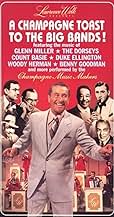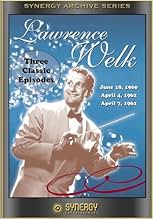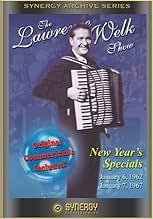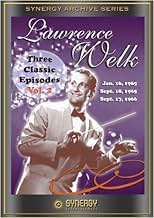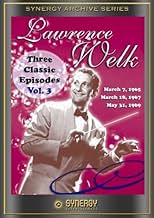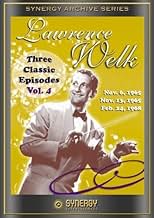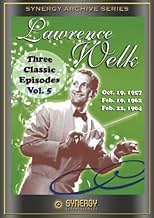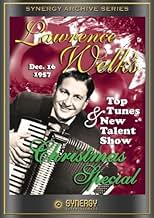Aggiungi una trama nella tua linguaOne of the most successful and fondly-remembered shows in TV history, "The Lawrence Welk Show" featured musical numbers and skits, with host Welk leading the band.One of the most successful and fondly-remembered shows in TV history, "The Lawrence Welk Show" featured musical numbers and skits, with host Welk leading the band.One of the most successful and fondly-remembered shows in TV history, "The Lawrence Welk Show" featured musical numbers and skits, with host Welk leading the band.
- Candidato a 1 Primetime Emmy
- 1 candidatura in totale
Sfoglia gli episodi
Recensioni in evidenza
After a few years on local television, Lawrence Welk continues to host his Saturday evening song and dance variety program before a national audience for another 27 years (1955-82).
Wholesome, nostalgic, quality presentation become the order of the day, as Lawrence Welk, with his thick Germanic accent, introduces his Orchestra, singers and dancers, and sometimes comedy sketches each week, usually taking time out for one instrumental number to welcome a string of lovely audience females to spin around the dance floor.
Episodes often spotlight one select theme, with an occasional tribute to a famous songwriter, as Jerome Kern, Henry Mancini, Johnny Mercer or Harry Warren, or a tribute to a music genre, as Swing Bands, Country & Western, Patriotic Songs, Hymns or Show Tunes, or a tribute to a holiday or season, colors, states, flowers... oh, just about anything healthy and wholesome, with fashionable costuming to suit the occasion.
Lovely soprano Norma Zimmer joins the cast as Welk's "Champagne Lady" near the end of 1960, and thankfully doesn't follow up on her plans for an early retirement, which is often discussed for more then two decades throughout the program's run.
Other recognizable singers who achieve fame for many fine performances upon "The Lawrence Welk Show" include Jimmy Roberts, Bob Ralston, Bob Lido, Joe Feeney, (Dianne, Peggy, Kathy and Janet) the Lennon Sisters, Guy Hovis and Ralna English, Gail Farrell, Dick Dale and Tom Netherton plus many orchestra members and other vocalists (although it may be considered a mixed bag of sorts in that regard).
Myron Floren, the "Happy Norwegian" accordionist, stands out from the band with his friendly perpetual smile, while capably accompanying the orchestra, while standing in a well-deserved spotlight of his very own.
Jo Ann Castle also performs before the spotlight with her dynamic piano arrangements, her instrument often decorated for every event, and even igniting in flames on occasion.
Arthur Duncan steps to the beat with his famous tap dancing routines during his weekly segments, as do Bobby Burgess and Cissy King with their range of meticulously-choreographed dances, ranging from Ballroom to Country. Bobby remains upon the program a bit longer than Cissy and, therefore, has other dance partners, but when it comes to performance, these three (Arthur, Bobby and Cissy) rank right up there with the best of the all-time greats.
So, this series lives up to its promises of quality entertainment, spanning the 1950's with the 1980's, and holds up quite well today in PBS rerun packages, which are introduced by "Lawrence Welk Show" alumni, who also offer interesting behind-the-scenes commentary in lieu of commercial breaks.
Wholesome, nostalgic, quality presentation become the order of the day, as Lawrence Welk, with his thick Germanic accent, introduces his Orchestra, singers and dancers, and sometimes comedy sketches each week, usually taking time out for one instrumental number to welcome a string of lovely audience females to spin around the dance floor.
Episodes often spotlight one select theme, with an occasional tribute to a famous songwriter, as Jerome Kern, Henry Mancini, Johnny Mercer or Harry Warren, or a tribute to a music genre, as Swing Bands, Country & Western, Patriotic Songs, Hymns or Show Tunes, or a tribute to a holiday or season, colors, states, flowers... oh, just about anything healthy and wholesome, with fashionable costuming to suit the occasion.
Lovely soprano Norma Zimmer joins the cast as Welk's "Champagne Lady" near the end of 1960, and thankfully doesn't follow up on her plans for an early retirement, which is often discussed for more then two decades throughout the program's run.
Other recognizable singers who achieve fame for many fine performances upon "The Lawrence Welk Show" include Jimmy Roberts, Bob Ralston, Bob Lido, Joe Feeney, (Dianne, Peggy, Kathy and Janet) the Lennon Sisters, Guy Hovis and Ralna English, Gail Farrell, Dick Dale and Tom Netherton plus many orchestra members and other vocalists (although it may be considered a mixed bag of sorts in that regard).
Myron Floren, the "Happy Norwegian" accordionist, stands out from the band with his friendly perpetual smile, while capably accompanying the orchestra, while standing in a well-deserved spotlight of his very own.
Jo Ann Castle also performs before the spotlight with her dynamic piano arrangements, her instrument often decorated for every event, and even igniting in flames on occasion.
Arthur Duncan steps to the beat with his famous tap dancing routines during his weekly segments, as do Bobby Burgess and Cissy King with their range of meticulously-choreographed dances, ranging from Ballroom to Country. Bobby remains upon the program a bit longer than Cissy and, therefore, has other dance partners, but when it comes to performance, these three (Arthur, Bobby and Cissy) rank right up there with the best of the all-time greats.
So, this series lives up to its promises of quality entertainment, spanning the 1950's with the 1980's, and holds up quite well today in PBS rerun packages, which are introduced by "Lawrence Welk Show" alumni, who also offer interesting behind-the-scenes commentary in lieu of commercial breaks.
FROM Hollywood....IT'S THE LAWRENCE WELK SHOW!!!!
This was the second longest-running musical variety program in the history of television and righteously so. It began on ABC-TV in the fall of 1955,under the title "The Dodge Musical Hour Starring Lawrence Welk",which at the time ABC was just a up and coming network which in turn his show became the steppingstone for the American Broadcasting Company's prime success which Lawrence Welk help start for that network! However,the earlier episodes of The Lawrence Welk Show were in classic black and white from 1955 until 1966. The show made the transition to color in the fall of 1966 and that same formula that Lawrence Welk had would remain from 1966 until 1971. However,his show would remain on ABC-TV for an astounding seventeen years on the air until its final episode in 1971. Lawrence Welk's musical variety show during its 17 year-run on network television is right up there with "Lassie",and "Murder,She Wrote",for the duration of its longitivity.
After ABC-TV cancelled "The Lawrence Welk Show" in the spring of 1971,the series found a new life when it was picked up for syndication where it remained for another eleven years on the air from 1971 until 1982. It all "The Lawrence Welk Show" was a Saturday night fixture in the homes of America for an astounding 27 years on television(The years on ABC-TV from 1955 until 1971,and in syndication from 1971 until 1982). After an astounding 27 years on television,"The Lawrence Welk Show" was picked up again in 1982,only this time around went from syndication programming to public television,where repeats of the show which include episodes from the mid-1960's and some of the 1970's and early 1980's have been seen since. About the show itself,this was a brilliant variety indeed that sent its viewers back to a time when variety shows were solid family entertainment and that is what you got with this show. Lawrence Welk was the quintessential band-leader who preserved big band music which at a period in American History reflected a taste to what Middle America was like at that time. It may have fallen out of favor,but lets face it,this was a show where good musicians and dancers were very professional,especially with some of Lawrence Welk's polka tunes and big musical numbers. However,the show did everything from classic American ballads,and other musical numbers from different countries. It maybe known for some of the tacky wardrobe of its day(see some of the episodes from the 1970's if you really what to find out)and outlandish musical numbers and watered-down dance routines. But in all solid family entertainment every Saturday night,and that is what you got with Lawrence Welk's musical variety program,which lasted three decades on television and to this day it is still being shown on public television stations across the country.
This was the second longest-running musical variety program in the history of television and righteously so. It began on ABC-TV in the fall of 1955,under the title "The Dodge Musical Hour Starring Lawrence Welk",which at the time ABC was just a up and coming network which in turn his show became the steppingstone for the American Broadcasting Company's prime success which Lawrence Welk help start for that network! However,the earlier episodes of The Lawrence Welk Show were in classic black and white from 1955 until 1966. The show made the transition to color in the fall of 1966 and that same formula that Lawrence Welk had would remain from 1966 until 1971. However,his show would remain on ABC-TV for an astounding seventeen years on the air until its final episode in 1971. Lawrence Welk's musical variety show during its 17 year-run on network television is right up there with "Lassie",and "Murder,She Wrote",for the duration of its longitivity.
After ABC-TV cancelled "The Lawrence Welk Show" in the spring of 1971,the series found a new life when it was picked up for syndication where it remained for another eleven years on the air from 1971 until 1982. It all "The Lawrence Welk Show" was a Saturday night fixture in the homes of America for an astounding 27 years on television(The years on ABC-TV from 1955 until 1971,and in syndication from 1971 until 1982). After an astounding 27 years on television,"The Lawrence Welk Show" was picked up again in 1982,only this time around went from syndication programming to public television,where repeats of the show which include episodes from the mid-1960's and some of the 1970's and early 1980's have been seen since. About the show itself,this was a brilliant variety indeed that sent its viewers back to a time when variety shows were solid family entertainment and that is what you got with this show. Lawrence Welk was the quintessential band-leader who preserved big band music which at a period in American History reflected a taste to what Middle America was like at that time. It may have fallen out of favor,but lets face it,this was a show where good musicians and dancers were very professional,especially with some of Lawrence Welk's polka tunes and big musical numbers. However,the show did everything from classic American ballads,and other musical numbers from different countries. It maybe known for some of the tacky wardrobe of its day(see some of the episodes from the 1970's if you really what to find out)and outlandish musical numbers and watered-down dance routines. But in all solid family entertainment every Saturday night,and that is what you got with Lawrence Welk's musical variety program,which lasted three decades on television and to this day it is still being shown on public television stations across the country.
I've been a drummer since 1971. The musicians are first class. And contrary to another reviewer,the music and swing are NOT watered down. Lawrence Welk indeed was a fine musician. He made quite a living playing the accordion when people were lucky to have a crystal set to listen to the radio.
If there can be any complaint about the music, one must realize that the audio recordings of TV shows of this era were not as widely dynamic or in stereophonic sound. Most TV sets of the era were pretty low fi in terms of sound.
IF there was one episode of the show that you could use to introduce people to the greatness of the show, I would suggest: Strike up the Band from 1964. Great, Great dancing by Barbara Boylan and Bobby Burgess. A perfect solo by Bob Ralston. And talk about swing? How about, "Slipped Disc" in the style of Benny Goodman? A great solo by Norman Bailey on trumpet of the great, "Sugar Blues" in the style of Clyde McCoy.
There are even more great tunes by the lennon sisters.
The Black and White quality is sharp as a tack.
Lawrence Welk single handedly kept big bands alive along with the Great American Song Book.
Is it corny? Well, corn is good for you! But its only corny if you are one of those guys who think you are too cool for school.
Top notch musicians. I mean they could play any style and go between styles in the same show as easily as you can imagine.
I've heard great Dixieland music, followed by popular music of the day, swing from the past and folk songs all in the same episode. All played very well.
Anyone who thinks otherwise might not know too much about music. Go to the shows of the late 50's and early 60's and you can see some GREAT electric guitar by neil lavang and the great buddy merril.
A leading exponent of traditional jazz/dixieland trumpet playing was the great Richard Cathcart. He was so good he did the trumpet work in the fine film, "Pete Kelly's Blues".
And then there was Bob Havens. Talk about excellent trombone players, he studied with the famous Jack Teagarden.
There were more than 1000 episodes of this show made. I only wish they were all available on DVD. I would pay top dollar for all 1000 eps!
What's wrong with this show? Nothing. Not a thing.
Somehow, this was pigeonholed as nothing but a polka show. Believe me they do polkas , but there is so much more. And they make the polkas lots of fun too.
Its on PBS now on almost 300 stations throughout the USA. Check your local listings. Some big fancy towns think they are above it all and you might not find it in some towns.
This show has been on as long as "I Love Lucy". And since there are MORE shows than "I Love Lucy" there is that much more entertainment.
I just wish I could personally tell all the performers what I really think of them.
to Barbara Boylan, the best looking girl ever on the show, you are a fantastic dancer and you are my favorite.
To Norman Bailey, what a great master of the trumpet, esp the mute!
To John Klein, the drummer, you did it all with such taste and dignity.
There isn't anyone on this show that I wouldn't be lucky to meet in person. God Bless you all!
If there can be any complaint about the music, one must realize that the audio recordings of TV shows of this era were not as widely dynamic or in stereophonic sound. Most TV sets of the era were pretty low fi in terms of sound.
IF there was one episode of the show that you could use to introduce people to the greatness of the show, I would suggest: Strike up the Band from 1964. Great, Great dancing by Barbara Boylan and Bobby Burgess. A perfect solo by Bob Ralston. And talk about swing? How about, "Slipped Disc" in the style of Benny Goodman? A great solo by Norman Bailey on trumpet of the great, "Sugar Blues" in the style of Clyde McCoy.
There are even more great tunes by the lennon sisters.
The Black and White quality is sharp as a tack.
Lawrence Welk single handedly kept big bands alive along with the Great American Song Book.
Is it corny? Well, corn is good for you! But its only corny if you are one of those guys who think you are too cool for school.
Top notch musicians. I mean they could play any style and go between styles in the same show as easily as you can imagine.
I've heard great Dixieland music, followed by popular music of the day, swing from the past and folk songs all in the same episode. All played very well.
Anyone who thinks otherwise might not know too much about music. Go to the shows of the late 50's and early 60's and you can see some GREAT electric guitar by neil lavang and the great buddy merril.
A leading exponent of traditional jazz/dixieland trumpet playing was the great Richard Cathcart. He was so good he did the trumpet work in the fine film, "Pete Kelly's Blues".
And then there was Bob Havens. Talk about excellent trombone players, he studied with the famous Jack Teagarden.
There were more than 1000 episodes of this show made. I only wish they were all available on DVD. I would pay top dollar for all 1000 eps!
What's wrong with this show? Nothing. Not a thing.
Somehow, this was pigeonholed as nothing but a polka show. Believe me they do polkas , but there is so much more. And they make the polkas lots of fun too.
Its on PBS now on almost 300 stations throughout the USA. Check your local listings. Some big fancy towns think they are above it all and you might not find it in some towns.
This show has been on as long as "I Love Lucy". And since there are MORE shows than "I Love Lucy" there is that much more entertainment.
I just wish I could personally tell all the performers what I really think of them.
to Barbara Boylan, the best looking girl ever on the show, you are a fantastic dancer and you are my favorite.
To Norman Bailey, what a great master of the trumpet, esp the mute!
To John Klein, the drummer, you did it all with such taste and dignity.
There isn't anyone on this show that I wouldn't be lucky to meet in person. God Bless you all!
This show doesn't get the respect it deserves...sure it is known for it's tacky wardrobe and watered-down musical numbers critics say, but compared to the tripe on television today, the show is a gem. I have meet several members of Lawrence's musical family in recent live shows, and they are perhaps the most friendly, down to earth entertainers you'll ever meet...and that is something you rarely see today! Also, if you're into pop culture history, watching the show can teach you something....and learn about music too!
Ooooh! Bubbles! Bubbles! Bubbles! Look at all of the pretty bubbles!
If you're interested in taking a trip to good, old "Squaresville, USA", then you need look no further than The Lawrence Welk Show from the 1960s, and beyond.
In a world where rock'n'roll was literally everywhere, TV impresario and conductor, Lawrence Welk offered the viewer conservative music, polkas and novelty songs as his idea of a musical alternative.
Even though Welk's show did have a tendency to be quite cute, corny, and cheesy, at times, its wholesome, good-natured atmosphere certainly did appeal to a vast North American audience and, with that, his show endured (by popular demand) for (get this!) 27 solid seasons.
*Note* - Lawrence Welk died in 1992 at the ripe, old age of 89.
If you're interested in taking a trip to good, old "Squaresville, USA", then you need look no further than The Lawrence Welk Show from the 1960s, and beyond.
In a world where rock'n'roll was literally everywhere, TV impresario and conductor, Lawrence Welk offered the viewer conservative music, polkas and novelty songs as his idea of a musical alternative.
Even though Welk's show did have a tendency to be quite cute, corny, and cheesy, at times, its wholesome, good-natured atmosphere certainly did appeal to a vast North American audience and, with that, his show endured (by popular demand) for (get this!) 27 solid seasons.
*Note* - Lawrence Welk died in 1992 at the ripe, old age of 89.
Lo sapevi?
- QuizFrom its move to network television in 1955 until the very early 1960s, the show's primary sponsor was Dodge. The Dodge name would be part of the set and during some performances, the shots would be framed so that the Dodge name would be unobstructed. As was common in the 1950s, the name of the primary sponsor would be part of the show's official title. During this period, this show's official title was "The Lawrence Welk Dodge Show."
- Citazioni
Lawrence Welk - Host: Wunnerful, Wunnerful.
- Versioni alternativeWhen the show is shown in syndication on PBS, it contains color presentation clips filmed and hosted by surviving members of the Welk musical family. This is presumably done to pad the show out to the length it would be with commercial breaks.
- ConnessioniEdited into Commercial Entertainment Product (1992)
- Colonne sonoreBubbles in the Wine
by Frank Loesser, Bob Calame, and Lawrence Welk
Paramount Music Corporation (ASCAP)
I più visti
Accedi per valutare e creare un elenco di titoli salvati per ottenere consigli personalizzati
- How many seasons does The Lawrence Welk Show have?Powered by Alexa
Dettagli
- Data di uscita
- Paese di origine
- Lingua
- Celebre anche come
- The Lawrence Welk Show
- Luoghi delle riprese
- Aziende produttrici
- Vedi altri crediti dell’azienda su IMDbPro
- Tempo di esecuzione1 ora
- Colore
- Mix di suoni
- Proporzioni
- 1.33 : 1
Contribuisci a questa pagina
Suggerisci una modifica o aggiungi i contenuti mancanti

Divario superiore
By what name was The Dodge Dancing Party (1955) officially released in India in English?
Rispondi
